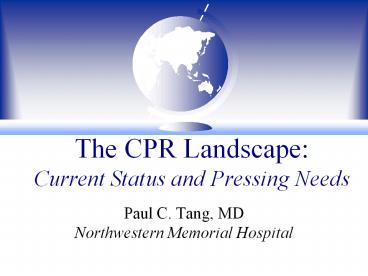The CPR Landscape: Current Status and Pressing Needs - PowerPoint PPT Presentation
1 / 21
Title:
The CPR Landscape: Current Status and Pressing Needs
Description:
Progress Report on the Computer-based Patient Record Since the 1991 IOM Report ... Glossary of Terms. Security Features for CPR Systems. Electronic Signature Policies ... – PowerPoint PPT presentation
Number of Views:24
Avg rating:3.0/5.0
Title: The CPR Landscape: Current Status and Pressing Needs
1
The CPR LandscapeCurrent Status and Pressing
Needs
- Paul C. Tang, MDNorthwestern Memorial Hospital
2
Outline
- Progress Report on the Computer-based Patient
Record Since the 1991 IOM Report - Users and Uses of CPR
- Remaining Impediments
- Role for NCVHS
3
CPR DefinitionIOM
- A CPR is an electronic patient record that
provides - complete and accurate data
- alerts
- reminders
- clinical decision support
- links to medical knowledge
- other aids
4
Institute of Medicine ReportFirst Edition, 1991
- Adopt CPR as the standard for all records related
to patient care - Establish public/private CPRI to focus national
agenda - Provide public/private support for CPR research,
development, and demonstration - CPRI Promulgate national standards for data and
security
5
Institute of Medicine ReportFirst Edition, 1991
- CPRI Review laws and regulations to facilitate
implementation of CPRs - Share costs of CPRs among all users of data
- Enhance educational programs on CPRs
6
National Priorities in Health CareChange in
Business Landscape
- Cut costs
- Capitate
- PCP as gatekeeper
- Generate quality reports
- Regulate managed care
- Audit billing practices
7
NCQA WarningIf You Dont Have an Information
System...
- Given the magnitude of the U.S. health care
enterprise, the need for excellent health plan
information systems for a variety of reasons is
clear and yet we do not have them. More often
than not, information systems are a barrier to
the efficient, effective use of data to measure
quality, improve care and service, manage
finances, and support clinical research.
8
NCQA To Providers and PlansGet One!
- Health plans, purchasers, and providers must
make a sustained investment of personnel, time
and resources. - New sets of performance measures will assume
that health plans have established the levels of
automation described in this report.
9
National Priority for DataData Driven Decisions
- Mandates
- Cut costs
- Capitate
- PCP gatekeeper
- Report quality
- Billing compliance
- Data-Enabled
- Manage costs
- Manage disease
- Manage demand
- Measure and improve
- By-product of care
10
Enabling TechnologiesChange in Technology
Landscape
- One world Internet connectivity
- Negroponte 1 B users by 2000
- One interface (viewer)
- Many computers
- Multiple platforms (H/W, OS)
- Legacy systems
11
Status of CPRDevelopment and Implementation
12
Users and CPR FunctionsExample Primary Users and
Functions
- Users
- Physicians
- Nurses
- Patients
- Functions
- Access complete, integrated data
- Provide confidentiality and security
- Ubiquitous access
- Decision support
- Patient education
13
Users and CPR FunctionsExample Secondary Users
and Functions
- Users
- Clinical management
- Administrative management
- Clinical researchers
- Health services researchers
- Functions
- Ability to aggregate data
- Maintenance of confidentiality
- Generate data as by-product of care
- Produce reports
14
IOM RecommendationsMid-Decade Follow Up
- Adopt CPR
- Establish public/pvt CPRI
- Public/private funding of research and
development - Share costs of CPRs among users of data
- Still a goal early adopters implementing
- CPRI established, largely privately funded
- Industry 99 CPR vendors at 98 HIMSS Public
NLM, AHCPR, NIST, DoD, VA - Still largely borne by users of CPR
15
CPRI Mandates from IOMPromulgate National
Standards
- 1996 National Summit on Health Information
Solutions - Collaborative effort (AHIMA, AMIA, CHIM, CHIME,
HIMSS, MLA) - Over 80 healthcare senior executive stakeholders
- Consensus on
- Universal Health Identifier
- Confidentiality and Security Laws and Policies
- Terminology Conferences to promote convergence of
terminology standards
16
CPRI Mandates from IOMPromulgate National
Standards, cont
- Proposed Standards Acceleration Project
- CPRI neutral forum, coordination
- Full-time efforts to developing standards, esp.
terminology - GCPR Project
- Complementary government project and national
standards development
17
CPRI Mandates from IOMPromote Enabling Policies
and Laws
- CPRI Guidelines on security and confidentiality
- Establishing Information Security Policies
- Information Security Education Programs
- Managing Information Security Programs
- Sample Confidentiality Agreements
- Glossary of Terms
- Security Features for CPR Systems
- Electronic Signature Policies
- URL www.cpri.org
18
CPRI Educational ProgramsEnhancing Education on
CPRs
- CPRI HIPAA Implementation Conference
- April 27-28, 1998
- CPRI General Meetings
- e.g., July 9, 1998 on Evaluating CPRs
- CPRI Davies Award Program for Excellence in CPR
Implementation - July 10, 1998
- CPRI Terminology Conference II
- Winter 98
19
Pressing NeedsDevelop CPRs and Demonstrate
Results
- Evolve products through use and continual
enhancement - Evaluate CPRs to understand and quantify benefits
and costs - Communicate results and best practices
- CPRI Davies Award Symposium
- Conferences and media
20
Pressing NeedsInfrastructure
- Standards
- Universal health identifier
- Clinical terminology
- Policies and Laws
- Confidentiality and security
- Cost sharing models
- Leadership and Strategic Planning
- Business needs for information
- High capital costs
21
Recommendations for NCVHSAdvancing Progress
Towards CPRs
- Standards
- UHI Conduct hearings, recommend solution
- Clinical terminology and data model Define
problem, recommend public funding to achieve
results by 2001 - Policies
- Confidentiality Keep legislative process on
track - Data and cost sharing Propose recommendations to
HHS for incentives and cost sharing































